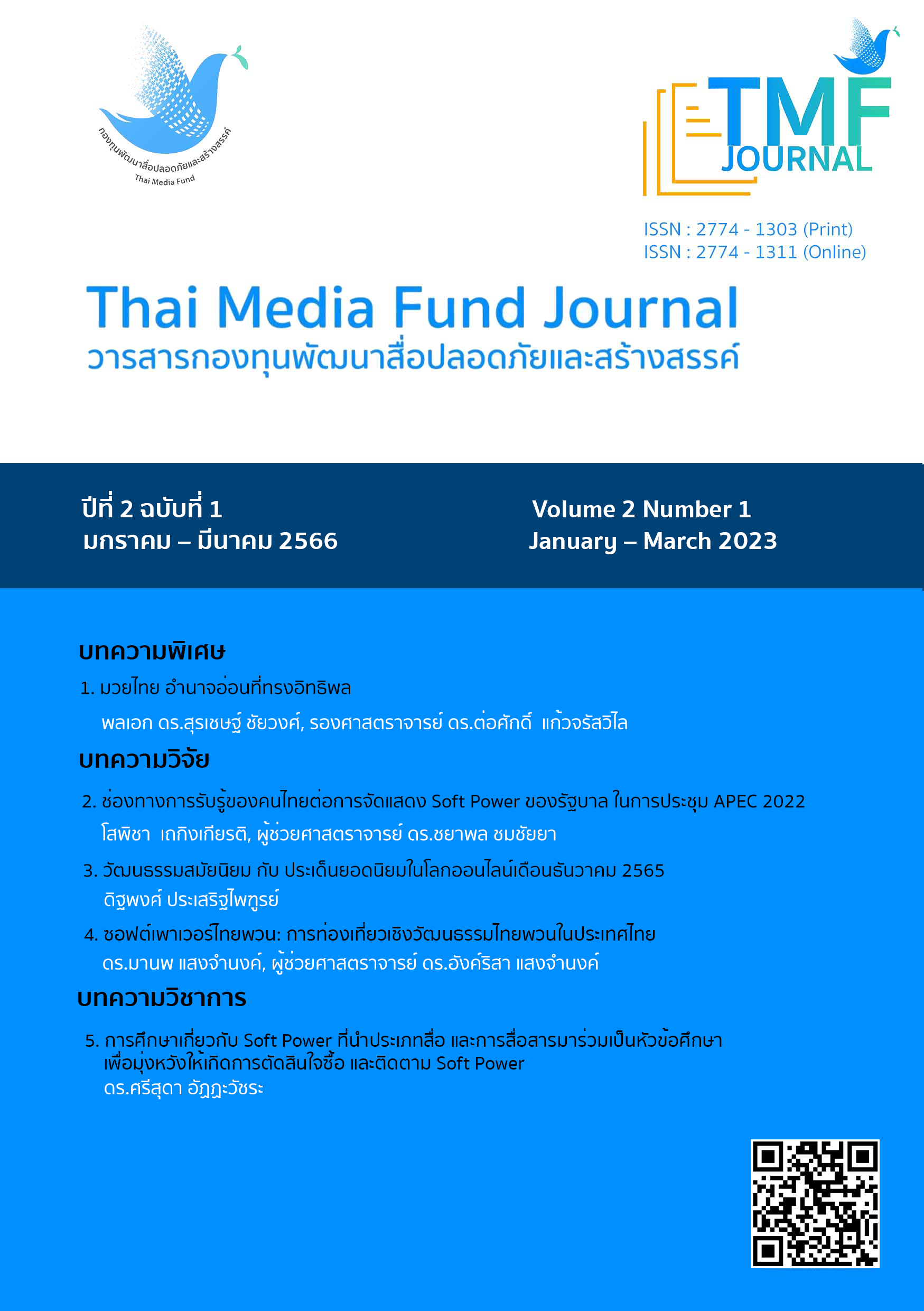การศึกษาเกี่ยวกับ Soft Power ที่นำประเภทสื่อ และการสื่อสารมาร่วมเป็นหัวข้อศึกษา เพื่อมุ่งหวังให้เกิดการตัดสินใจซื้อ และติดตาม Soft Power
Main Article Content
บทคัดย่อ
จากการศึกษาหัวข้อวิจัย บทความวิชาการ บทความทั่วไป 15 เรื่อง จาก 50 เรื่อง หรือร้อยละ 30 โดยค้นหาด้วยโทรศัพท์เคลื่อนที่ ซึ่งเป็นเครื่องมือที่บุคคลทั่วไปเข้าถึงโดยง่าย ในแพลตฟอร์ม Google เมื่อวันที่ 18 มกราคม พ.ศ. 2566 ลักษณะการเลือก 15 เรื่อง เลือกอันดับที่พบ 1 ถึง 15 จาก 50 เรื่อง การศึกษาพบว่า มี 1 เรื่อง ที่มีชนิดของสื่อร่วมเป็นหัวข้อศึกษาร่วมกับ Soft Power ได้แก่ คำว่าสื่อภาพยนตร์ 2 เรื่อง การ์ตูน 1 เรื่อง จาก 15 เรื่อง พบ 3 เรื่อง คิดเป็นร้อยละ 20 นอกนั้นเป็นประเด็นอื่น ๆ ดังนั้น เพื่อให้เกิดผลตามความมุ่งหวังในการใช้ Soft Power เป็นตัวกระตุ้นความต้องการซื้อ จึงเห็นว่าควรจะมีการศึกษาชนิดของสื่อ และการสื่อสารร่วมกับ Soft Power มากขึ้น ด้วยจะทำให้ขั้นตอนการตัดสินใจซื้อ ขั้นที่ 1 การกระตุ้นทำให้เกิดความต้องการซื้อ ขั้นที่ 2 การค้นหาข้อมูลข่าวสารจากแหล่งข่าว เพื่อส่งผลไปยังขั้นที่ 3 การประเมินทางเลือก และขั้นที่ 4 การตัดสินใจซื้อ หรือติดตาม Soft Power ได้อย่างมีประสิทธิภาพ
Article Details

อนุญาตภายใต้เงื่อนไข Creative Commons Attribution-NonCommercial-NoDerivatives 4.0 International License.
เอกสารอ้างอิง
Charoen, P. (n.d.). Japanese Cartoon: Soft Power of Japanese Cultural Policy. Japanese Journal of Thammasat Studies, 29(1), 76-85.
Jaichaphoa, N. (2019). South Korea's Soft Power: Korean Culture Wave in Chinese Society. Independent Study, Bachelor of Political Science, Department of Political Science and Public Administration, Graduate School, Naresuan University.
Kotler, P. (2003). Marketing management. Englewood Cliffs, NJ: Prentice Hall.
Lophatthananon, T (n.d.). 4A 2R and the Description of Soft Power as a Power Process. Retrieved from http://www.ias.chula.ac.th/article/4a-2r-with explanation-soft-power-as a person/
Lohphatthananon, T, et al., (2021). Movies and Soft Power Strategies. Dhurakij Pundit Communication Journal, 15(1), 188-221.
Mamanee, A. (2012). The Use of Soft Power in Promoting International Relations: A case study of the implementation of Thai Team in Nepal. Retrieved from https://image.mfa.go.th/mfa/0/yZ0EO327fd/nbt/nbt4/IS4024.pdf
Marketee,r S. (2022). Soft Power, Unexpectedly Strong Power Helping Brands Capture the Hearts of Consumers. Retrieved from https://marketeeronline.co/archives/285425
Ministry of Culture. (2022). Ministry of Education Driving Soft Power Activities to Stimulate the Economy with Cultural Products, Food, Thai Fabrics and Movies, Creating an Image of a Country Rich in Culture. and Influencing the World. Retrieved from https://www.thaigov.go.th/news/contents/details/59131
Ministry of Tourism and Sports. (2022). TAT Awakens Soft Power, PP-Billkin tag team, to launch a Stylecation campaign to invite people to travel in Thailand in the right style to stimulate domestic tourism. Retrieved from https://www.mots.go.th/ne, /14102
Office of Knowledge Management and Development (OKMD). (2022). The Knowledge. Retrieved from https://www.okmd.or.th/upload/pdf/2565/PDF/the knowledge vol22.pdf
Pannuam, W. (2012). Promoting Japanese Cartoons: Soft Power Increasing Tools and Economic Benefits. Journal of Japanese Studies, 29(1), 76-85.
Pengsawat, W. (2008). Research methodology. Bangkok: Suweeriyasa.
Phisanyabutr, N. (2021). Thai Soft Power: Why doesn’t it work? Retrieved from https://tdri.or.th/2022/04/soft-power-thai/
Pornsakulwanich, W. (2017). New Media and Communication Management. (3rd edition). Bangkok: Thammasat University Press.
Ramasoot, P. (2022). Digital Platforms: An Analysis with an Economic Perspective. Journal of Safe and Creative Media Development Fund, 1(2), 1-39.
Sae-ung, K. (2019). Soft Power Policy and Cultural Exports of South Korea, 1997-Present.
Independent Study, Bachelor of Arts, Asian Studies Program, Faculty of Arts, Silpakorn University.
Samerjai, C. (2007). Consumer Behavior. Bangkok: SE-EDUCATION.
Sangpanya, P. (2018). The New Southbound Policy: Taiwan's Soft Power. Bodhi Research Journal, 2(1), 74-99.
Sombatpanich, P. (2004). Advertising in the Decade 2000-2010: A Study of Media Factors Affecting Advertising Format. Doctor of Philosophy Thesis, Major in Mass Communication, Faculty of Journalism and Mass Media, Thammasat University
Srisaengngam P. (2022). Soft Power through Cooperation in Higher Education, Science and Innovation. Retrieved from https://www.the101.world/soft-power-mhesi/
Srisuksai, T. (2022). Creating Media Literacy to Create an Intellectual Vaccine for Society. Journal of Safe and Creative Media Development Fund, 1(1), 1-21.
Suksawang, P. (2017). A Causal Model of Factors Affecting Depression: MIMIC Model Journal of Nursing and Education, 12(2), 62-67.
Thai media Fund. (2022). The Power of Soft Power: Movie Series and Tourism. Retrieved from https://www.thaimediafund.or.th/articlesoftpower/
Thai media Fund. (2022). The Power of Soft Power: Movie Series and Tourism. Retrieved from https://www.thaimediafund.or.th/ articlesoftpower/
Thanita FN. (2022). Soft Power: Great Power is not Just about Soft Things. Retrieved from https://foretoday.asia/articles/soft-power/
Thanita FN. (2022). Soft Power: Great Power is not Just about Soft Things. Retrieved from https://foretoday.asia/articles/softpower/
TRF. (2017). Keeping an Eye on ASEAN, Thailand's Soft Power Strategy. Retrieved from https://www.aseanwatch.org/wp-content/uploads/2018/10/policy proposal-soft-power-revised.pdf
Warapamorn, P., and Phisonyabutra, N. (2021). Thai Soft Power: Why doesn't it work? Retrieved from https://tdri.or.th/2022/04/soft-power-thai/


